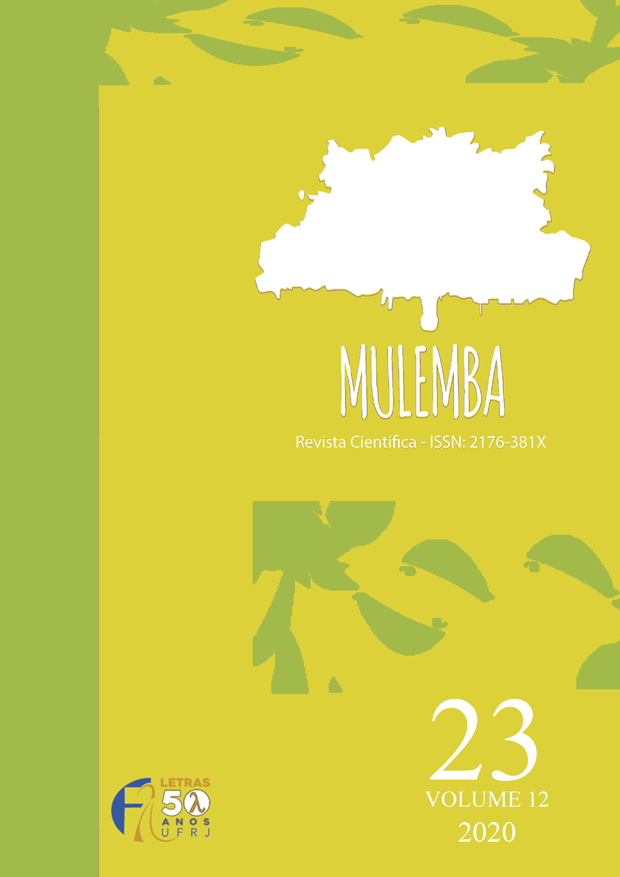Sobre uma águia chamada Mutola
DOI:
https://doi.org/10.35520/mulemba.2020.v12n23a39270Keywords:
Ficção curta, Autoria feminina, AntropomorfizaçãoAbstract
RESUMO:
O objetivo deste estudo é analisar o conto Mutola, da escritora moçambicana Paulina Chiziane. A ficção curta de autoria feminina moçambicana explora várias subjetividades poéticas, uma delas é a figuração simbólica e alegórica de animais que se antropomorfizam em personagens para melhor representar as tensões da realidade das mulheres. No conto em tela, a águia surge como uma metáfora para resistência feminina contra o machismo patriarcal moçambicano. As análises empreendidas foram conduzidas pela orientação crítica de (CHIZIANE: 2013, p. 12), (BOURDIEU: 2002,p.10), (ECKMAN, 2011, p.31), (ZANELLO, 2018, p.177) entre outras convocadas pelas análises empreendidas.
PALAVRAS-CHAVE: Ficção curta; Autoria Feminina; Antropomorfização.
References
BOURDIEU, Pierre. A Dominação Masculina. Tradução Maria Helena Kuhner. 2ª Ed. Rio de Janeiro: Bertrand Brasil, 2002
CHIZIANE, Paulina. Eu, mulher... Por uma nova visão do mundo. Belo Horizonte: Nandyala, 2013.
_________________. As andorinhas. Belo Horizonte: Nandyala, 2013.
DEL PRIORE, Mary. História do amor no Brasil. São Paulo: Contexto, 2011.
ECKMAN, Paul. A linguagem das emoções. São Paulo: Lua de Papel, 2011.
PLATÃO. Fedro. São Paulo: Martin Claret, 2003.
SECCO, Carmen Lucia Tindó. Entre fábulas e alegorias: ensaios sobre Literatura Infantil em Angola e Moçambique. Rio de Janeiro: Quartet, 2007.
ZANELLO, Valeska. Saúde mental, gênero e dispositivos: cultura e processos de subjetivação. Curitiba: Appris, 2018.
Downloads
Published
Issue
Section
License
Authors who publish with this journal agree to the following terms:
- Authors retain copyright and grant the journal right of first publication with the work simultaneously licensed under a Creative Commons Attribution License that allows others to share the work with an acknowledgement of the work's authorship and initial publication in this journal.
- Authors are able to enter into separate, additional contractual arrangements for the non-exclusive distribution of the journal's published version of the work (e.g., post it to an institutional repository or publish it in a book), with an acknowledgement of its initial publication in this journal.
- Authors are permitted and encouraged to post their work online (e.g., in institutional repositories or on their website) prior to and during the submission process, as it can lead to productive exchanges, as well as earlier and greater citation of published work (See The Effect of Open Access).

